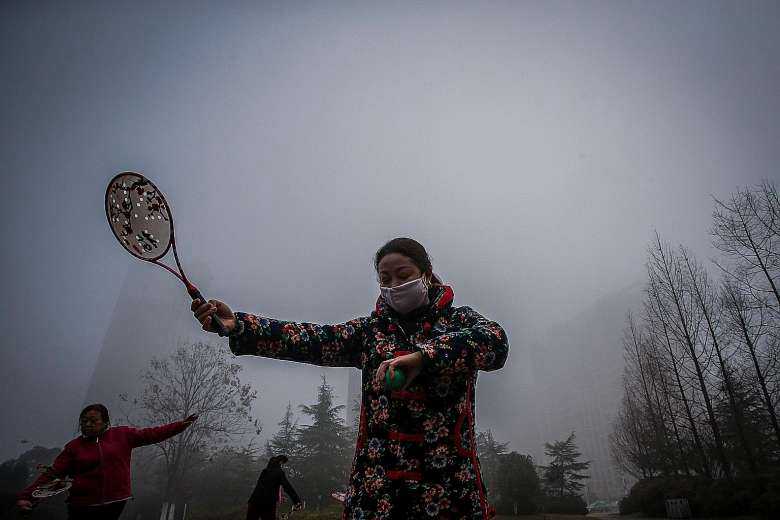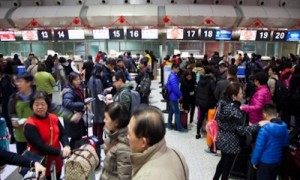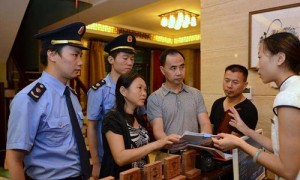导读:入冬以来,我国华北地区就频频上演大雾霾天,一些地方甚至是出现持续的重度污染。不少家长出于对孩子们的关爱,决定将他们送往没有雾霾的华南地区。对此,你怎么看?

BEIJING --To escape the winter smog, a growing number of Chinese parents have resorted to sending their children to the south.
(北京电 )为了避开冬天的雾霾,越来越多的中国家长已经诉诸于将他们的子女送往南方。
One of them, identified only as Mr Yu, told a Hong Kong newspaper that the best decision he has made since the start of the new year was to send his three-year-old son to live with relatives in southern Guangdong province.
其中一位姓于(音译)的先生向一家香港报纸表示,新年以来他做出的最明智的决定就是将他三岁的儿子送到南方广东省的亲戚家居住。
"Even though we have paid 5,000 yuan (S$1,000) to 6,000 yuan in monthly school fees, the money spent is worth it," the Beijing resident told the Chinese-language paper Wen Wei Po.
这位北京居民向中文报纸《文汇报》说道:“虽然我们每个月支付了5000(1000新加坡元)~6000元的学费,但是这钱花得值。”
He said his child had several bouts of flu and cough, and had to visit the doctor every week since the start of winter. The boy was even put on asthma medication.
他指出,入冬以来,他的孩子得过几次流感和咳嗽,不得不每周都去看医生。甚至还吃上了哮喘药物。
"Miraculously, all his symptoms cleared up the minute he reached Guangdong," Mr Yu added.
于(音译)先生还补充道:“神奇的是,他所有的症状在他来到广东之后就立马没了。”
"Paediatric wards are like a barometer of the weather," Dr Zhang Jiao, a paediatrician at Beijing United Family Hospital, told China Daily.
北京和睦家医院的儿科专家张娇(音译)医生向《中国日报》表示:“儿科病房就像是天气的一个晴雨表。”
"Children are most sensitive to the weather, and conditions such as fever and cough are common on days with poor air quality."
“儿童对天气最为敏感,发烧和感冒在空气质量不好的日子里很常见。”
Mr Yu said that at least five other pupils in his son’s class have also taken the dramatic measure of escaping to the smog-free south.
于(音译)先生指出,他儿子所在的班级里至少还有五名学生已经采取了惊人的举措——逃往没有雾霾的南方。
Another parent, identified as Madam Xiao, said she sent her parents and two young children to Sanya in Hainan province.
另外一名姓肖(音译)的家长表示,她将她的父母和两个孩子送到了海南省三亚。
"We have managed to avoid this round of smog... But how long can we run away from the pollution?
“我们躲过了这一轮雾霾……但是我们能够逃离污染多长时间呢?”
"What is going to happen when the children start school?" said Madam Xiao, who owns a property in Sanya.
在三亚有一套房子的肖女士说道:“孩子开学的时候还会发生些什么?”
The newspaper said that for many wealthy Chinese families, one of the biggest dilemmas they face is whether they should continue to reside in Beijing, which has the best schools in China, or emigrate to another country so their children can grow up in a healthy environment.
报纸上说,很多富裕的中国家庭面临的最大的窘境之一就是继续留在有着中国最优秀学校的北京还是移民国外,这样他们的孩子们就能够在健康的环境下成长了。
Ctrip.com, China’s biggest travel website, estimated that 150,000 people would travel overseas to avoid pollution.
中国最大的旅行网站携程旅行网统计,15万人出境旅行是为了避开污染。
Those who cannot go too far can seek refuge only by wearing face masks and using air purifiers.
那些无法远行的人们只能通过戴上面罩和使用空气净化器寻求庇护。
"I am just one of the ordinary people. Protection is all I can do," said 39-year-old Associate Professor Du Haihong. She has two air purifiers and dozens of face masks at home, and tries to keep her 13-year-old at home as much as possible.
39岁的副教授杜海红(音译)说道:“我只是普通人当中的一员。防护是所有我能够做到事情。”她家里有两台空气净化器和很多面罩,她努力让13岁的孩子尽量待在家中。
Of the 74 cities monitored by the Ministry of Environmental Protection last year, her city - Baoding in Hebei province - has the worst air.
在环保部去年监控的74个城市当中,她居住的城市河北省保定空气质量最差。
Prof Du said she and her daughter have only one criterion when picking a travel destination: Blue skies.
杜教授说道,她和她的女儿在选择旅行目的地时只有一个标准,那就是蓝天。







